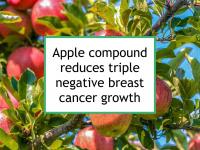Phloretin, a type of flavonoid found primarily in apples, has been shown to inhibit the growth of various types of cancer cells. Phloretin also enhances the sensitivity of cancer cells to paclitaxel and cisplatin chemotherapy. In fact, phloretin has been shown to reverse multidrug resistance in breast cancer cells.
The development of multidrug resistance is a major cause of immediate or eventual chemotherapy failure. Now a new study has reported that phloretin inhibits triple negative (ER-/PR-/HER2-) breast cancer cell growth and migration by interfering with glucose transport into the cells.
Latest research finds phloretin inhibits TN cancer
The study referenced above was designed to investigate whether using the apple polyphenol phloretin to inhibit glucose transporters could be an effective treatment for triple negative breast cancer. Glucose transporters (GLUTs) are proteins that help cells import glucose by a type of diffusion. Since most cancer cells have a preference for high glucose conditions, glucose transporters are targets for cancer therapy.
To conduct the study, the authors used phloretin as an antagonist of GLUT2 function in MDA-MB-231 triple negative breast cancer cells. Phloretin treatment (at 10-150 μM, for 24 hours) was found to inhibit cell growth and arrest the cell cycle in a p53 mutant-dependent manner. p53 is a tumor suppressor protein whose activation normally results either in cell death or DNA repair. However, p53 mutations can endow p53 with new functions.
Phloretin treatment was also found to significantly reduce the migratory activity of triple negative cells.
The authors also used a mouse model of triple negative breast cancer (BALB/c nude mice bearing MDA-MB-231 tumor xenografts) to test the effects of phloretin. Phloretin was confirmed to have anti-tumorigenic effects in the mice in a six-week experiment. This was accompanied by expected changes in the mouse tumor tissue, including an increase in p53.
The authors conclude that phloretin could potentially suppress triple negative breast cancer cell growth and metastasis through inhibition of GLUT2.
Please see our article on triple negative diet for more information.
